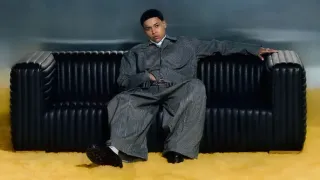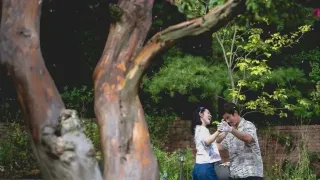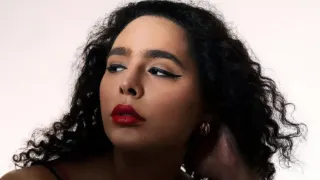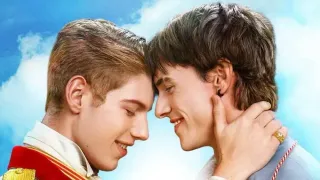April 27, 2019
'Hadestown's' André De Shields: That Mature, Sexy Black Man in a Silver Suit
Frank J. Avella READ TIME: 12 MIN.
Broadway legend Andr� De Shields requested a face-to-face sit down interview, immediately making him an atypical Broadway star in my mind. Happy to oblige, I arrived at the Walter Kerr Theatre stage door and was greeted by the "Hadestown" press rep who escorts me up a few flights of labyrinthine stairs and into his dressing room, where I was to spend the next hour absolutely riveted as he regaled me with stories of his past, present and future as well as his life and career philosophies. The man was surprisingly candid and took his time, always uploading the exact thoughts he wanted to convey with deliberate care and a singular dramatic panache.
To call it a fascinating conversation is an understatement. We even high fived as he delighted in the fact that that I had seen his performances in several shows, including the ill-fated but ambitious play, "Prymate."
De Shields' illustrious career has spanned a half century and he's tapped his toe in every medium and almost every concentration including acting, directing, dancing, singing, choreographing and as teacher. He's received numerous awards and has starred on Broadway in varied productions, including "The Wiz," "Ain't Misbehavin'" (Emmy Award), "Play On!," and "The Full Monty."
He is currently commanding the stage (more on that below) in the bold, spectacular genre-blend musical, "Hadestown," which takes on the tale of Orpheus (Reeve Carney) and Eurydice (Eva Noblezada) as well as Hades (a stunning Patrick Page) and his wife Persephone (the brilliant Amber Gray). And the evening's MC of sorts is none other than Hermes himself, embodied by the Renaissance man himself, Andr� De Shields.
Below is just a sampling of what was discussed when EDGE sat down with the master.
EDGE: As Hermes, you come out and just command that stage...
Andr� De Shields: How kind of you to say...
EDGE: So much of the audience's embrace of the show has to do with those opening moments as you set the stage...
Andr� De Shields: You are absolutely correct. Let me start by saying this: Everything is political... the way I dress is political, what I eat, the way I walk, the people with whom I establish relationships are for political reasons... when that character walks onstage – this mature, sexy black man buttoned up in a silver suit, he's making a political statement. And it's one that's very contemporary... one that's made more possible by the cultural tectonic shift this city, this country, and the world is taking toward feminism.
What I'm doing is making a contract with the audience. Who is this walking out on stage?... Buttoned up in a silver suit and he undoes one button... that moment possesses so much agency. It's an invitation. Because what I see is the world. It's not a homogenized audience; it's totally diverse. And I have to set the right tone. So that everyone leans forward and smiles... the contract I'm making is: Join me on this journey. It might challenge you, it might change you, but it's not going to hurt you. And how is that command... power manifested? One big shit-eating grin! That's politics.
EDGE: Much of that "command" comes from the fact that you are representative of so many things. Firstly, you're Broadway history...
Andr� De Shields: I'll take it!
EDGE: You're also a gay icon. Someone who was out before it was safe to be out.
Andr� De Shields: Before the Stonewall revolution! ... When I was growing up, to be gay meant to be cavalier–to be happy. How did that get appropriated by the revolution that bears the name Stonewall? Even now, these many years later, we're anything but carefree.
EDGE: We're not allowed to be.
Andr� De Shields: Exactly. When I was a young man, the benign euphemisms were, 'He's light in his loafers,' 'He's musical' 'He's enchanted,' 'He has lavender leanings.' Of course, there were malignant euphemisms, also.
EDGE: In "Hadestown," Hermes sets the stage in a distinct way...
Andr� De Shields: That first song, "Road to Hell" is expositional... Hermes has introduced all the characters, then he has to introduce himself. So what does he say?
"On the road to hell there was a railroad station and a man with feathers on his feet."
... If you're sitting in the audience and this guy in a silver suit says, 'I'm Hermes, the man with feathers on his feet,' is that not being light in the loafers?
Let Hermes be whoever you need him to be. But I know that there's a vast community of gay men who come to see the show, for many different reasons. But one of the reasons is there is a character who represents, even in the world of pagan gods, the other. And that's Hermes.
EDGE: How did you forge your path as an out African-American artist?
Andr� De Shields: I grew up in Baltimore, Maryland, in a classic example of what you'd call an inner city, a ghetto. Impoverished. Ten siblings. I refer to myself as Lucky Number Nine... I was content to be a solitary child, speaking prescient ideas. As Hermes says in "Hadestown," 'You might say he's touched, because he's touched by the gods.' Now, I don't want to come off as pretentious, but when people ask me questions such as yours, my answer is: I live an anointed life. As an adult, I've surrendered to my destiny.
As a child, because of the deferred dreams of my mother and father, who – my mother wanted to be a dancer, my father wanted to be a singer – they were not allowed to do that. So I've never wondered about the purpose of my life. I've always known that I would be here someday.
EDGE: That's extraordinary.
Andr� De Shields: It is extraordinary. I didn't know it was extraordinary until I was on the journey and found that so many people lost their way... You really have to put on that blinder and not be distracted by all the shiny objects – all the pretty things...
EDGE: Because it's easy.
Andr� De Shields: Yeah, it's easy. It's not fulfilling, though. What's fulfilling is hard. And that's what discourages so many people... I have learned that slowly is the fastest way to get there.
That's how I got out of Baltimore because my peers are all dead. To make it to the age of 25 was the goal for all of us. What you read in the newspaper about the black male, be he young or mature, being a target for police violence in this country is true... and every responsible black parent has to speak to the male in the family and say this is how you must act in the presence of a policeman. Because no matter what your size, attitude, education, the guy in blue with a gun feels you are threatening his life. So people say I'm so cool, so chill. That's because I'm gonna live as long as Methuselah did! (laughs)
EDGE: Did young Andr� want to be an artist?
Andr� De Shields: Yes... when I was young I wanted to be Sammy Davis, Jr. He is the epitome of entertainment virtuosity.
Something else I've learned if you choose this profession, that's only half of the equation. The other half is that the profession has to choose you. Because there are no guarantees in this industry but two. And it's not fame and fortune. It's rejection and insecurity. So every once in a while I'll do a master class and I say to the young people: You're going to be lonely in this industry. If you can make rejection your companion... And you're going to be hungry in this industry. If you can make insecurity your meal... that's the evidence that the industry is choosing you. Now you're ready to start paying your dues.
EDGE: If someone said to you, you could choose your next gig. Would it be as actor, director, dancer?
Andr� De Shields: Are you talking about the discipline or just the opportunity?
EDGE: The discipline.
Andr� De Shields: Then I would direct. Because there is so much fine talent rotting on the vine because directors with some exceptions, will not take risks... They hire the people that they know will do what they want. That's not inclusive. It's not diverse. And it certainly isn't equity. And I do direct. And during those opportunities I get to direct, I want to cast people who (quotes "A Chorus Line") "I need this job." Those are the people I want to work with. Because they will come up and take deep dives...They're nowhere near the land of being jaded. They want to work. They want to know the deliciousness of this fruit when it's ripe and juicy and delectable and nourishing. And that's power that I would like to use more often than I've had the opportunity to because at 73 I'm still employable.
EDGE: Tell me about your journey with "Hadestown?"
Andr� De Shields: Very few people involved in this iteration know – and the people who do know do not speak of it – in 2012, Ana�s Mitchell and Dale Franzen, (producer) did a workshop at Second Stage, in their rehearsal rooms of "Hadestown." I played Hermes... I bring this up because more often than not the people will speak about the inception of "Hadestown" at the New York Theatre Workshop. Well that was 2016. I did the workshop in 2012. I injected Hermes with my DNA. I was like a junkyard dog. I pissed all over Hermes. Anyone comes near it they'll smell Andre De Shields on it. Now, it happens in this industry that things go away from you. And you have to put on your big boy pants and say, Okay, it wasn't meant for me. And it went away from me until 2017.
EDGE: How did it come back?
Andr� De Shields: It came back when Ana�s Mitchell encountered Rachel Chavkin. She found the director who matched her desires for the project... Through these series of labs that took the show to the National in London, Ana�s came back to Hermes... she had Rachel and me meet... but what I was confident of is the boomerang effect of investing one's DNA in a character... I knew if "Hadestown" is going to have legs, then it's got to be the legs that I grew for Hermes.
EDGE: What are your thoughts on how far LGBTQ people have come vs. how far we need to go?
Andr� De Shields: In "Hair," which I did in Chicago, the opening song is "Aquarius." (He sings the first 30 seconds of the song, which is beyond a treat) Now, in 1969 when we were singing that, we were hopeful, optimistic. We were the counterculture. And we believe that through the act of loving we could be the change we wanted to see in the world. What we didn't understand was how long the dawning of the Age of Aquarius would take. We thought, maybe in the next year or two. Maybe in 1975. But the dawning of an age takes about 500 years. An end of an age takes about 2000 years... But we now have very tantalizing hints that we can be the change in the world that we want.
But I see the difference – I have long term memory, back to 1949. We have made a great deal of progress. What the progress is unveiling are the paroxysms of the reigning paternalistic patriarchy that does not want to let go of the reigns of power. They're going to fight to the bloody end.
I believe the answer is not equally paraschematic confrontation, which is why "Hadestown" is now rising like cream to the top because its politics are empathy, patience, allowance, a word that very few of us understand – sometimes you simply have to "allow" things to happen. Allow things to atrophy, die and disappear... To allow an age to run its course...
EDGE: Let's go back to 1969 and "Hair." Can you paint me a picture of what that experience was like?
Andr� De Shields: Crazy good. First of all I got to work with the original artistic team... After the show moved from off-Broadway to Broadway, the second commercial production was in Los Angeles. The next was in Chicago at the Shubert Theater. I did it for 15 months... at one point Paul Butler, who was the commercial producer of "Hair," had 35 simultaneous sit-down productions of "Hair" running throughout the world. It wasn't a tour. It was 35 productions running simultaneously.
This was 1969 throughout the world. Nobody was talking about the doctrines of diversity and equity and inclusion then, it was just the way you live.
EDGE: Do you feel ensemble theatre remains as embracing as it used to be?
Andr� De Shields: It has changed... We are all human. What makes us human is that we have predilections, biases, predispositions, preferences. Where biases mean the least is in communities that are built on arts, particularly performing arts, because the question is, Do you want to do this? The answer is, Yes. Now, the condition is if you want to do this, You have to give up your biases, because this isn't about separation, it's about collaboration. This is about respecting the collective power of being able, through telling a story, to transform an individual's life or altering a government or, as I've said, being the change in the world that you desire. That's true power. Anything else is fear. And fear is always destructive. You can't build anything on fear.
For more on Andr� De Shields, For more on "Hadestown,"






